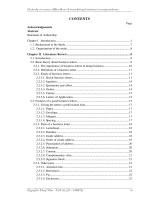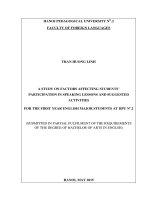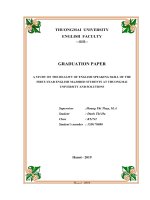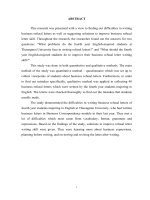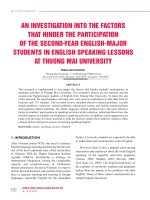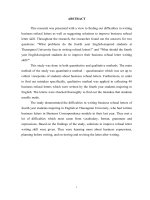A study on some difficulties in using spoken language at workplace of the fourth year english majored students, thuongmai university
Bạn đang xem bản rút gọn của tài liệu. Xem và tải ngay bản đầy đủ của tài liệu tại đây (362.2 KB, 51 trang )
THUONGMAI UNIVERSITY
ENGLISH FACULTY
------
GRADUATION PAPER
A STUDY ON SOME DIFFICULTIES IN USING SPOKEN LANGUAGE AT
WORKPLACE OF THE FOURTH-YEAR ENGLISH MAJORED
STUDENTS, THUONGMAI UNIVERSITY
Supervisor:MA Pham Minh Hong
Student: Nguyen Thi My
Clas: K52N4
Student’s code: 16D170241
Hanoi, 2020
HÀ NỘI - 2016
ABSTRACT
Nowadays, along with the unstoppable development of worldwide economy,
English is the global language which is recognized in over the world. Therefore,
English plays a vital role in studying as well as employees’ career paths . It is like a
bridge that helps you find a good job and bring a higher income.
A lot of companies from many countries directly invest in Vietnam, so
numerous job opportunities can be approached to Vietnamese people, especially for
newly- graduated students.
In fact, a lot of students in Vietnam have a very weak English proficiency after
graduation. Therefore, the fourth-year English students can cope with problems when
using spoken language at work place. This study aimed at enhancing the use of
communication skills of the seniors at English Department,Thuongmai University.
During studying period at English Department, Thuongmai University, the
researcher had a chance to access difficulties of students when using English to
communicate. Therefore, the researcher decided to choose the research “ A study on
some difficulties in using spoken language at workplace of the fourth-year English
majored students, Thuongmai University”.
1
ACKNOWLEDGEMENT
During the process of implementing the study, I have received a lot of
essential help and valuable ideas from my teachers, family and friends. This
research can not be completed without the great assistance and encouragement from
those people who all deserve my sincerest thanks and appreciation.
First of all, I would like to express my greatest gratitude to my supervisor Ms. Pham Minh Hong who is truly enthusiastic for the valuable guidance and
support. With her precious advice and assistance, I was able to fulfill this thesis.
Secondly, I would like to thank all students and interviewees at English
Department, Thuongmai University who involved in this thesis for their huge
contribution .
Moreover, I hope to express my sincere gratitude to all lecturers at English
Department, Thuongmai University. I am really grateful for their dedication during
4 year teaching and giving knowledge to all students. The knowledge I have gained
not only for the thesis but also a treasure for my entire life.
Finally, I would like to thank for the greatest support and encouragement from
my family and friends, which played important roles in my graduation paper.
Hanoi, 23/04/2020
Student
Nguyen Thi My
2
TABLE OF CONTENTS
ABSTRACT..............................................................................................................i
ACKNOWLEDGEMENT......................................................................................ii
TABLE OF CONTENTS.......................................................................................iii
LIST OF ABBREVIATIONS..................................................................................v
CHAPTER 1: OVERVIEW OF THE STUDY......................................................7
1.1 Rationale............................................................................................................7
1.2 Previous studies.................................................................................................8
1.3 Aims of the study...............................................................................................9
1.4 Research subjects..............................................................................................9
1.5 Scope of the study..............................................................................................9
1.6 Research methodology......................................................................................9
1.7 Organization of the study...............................................................................10
CHAPTER 2: LITERATURE REVIEW.............................................................11
2.1 The growth of foreign investment overview in Vietnam in recent years.....11
2.2 An overview of spoken language....................................................................11
2.2.1 The definition of spoken language..............................................................11
2.2.2 The characteristics of spoken language......................................................12
2.2.3 The significance of speaking skills..............................................................13
2.2.4 The functions of speaking skills..................................................................14
2.2.5 The reality of employees’ English skills.......................................................15
2.3 Common problems of English speaking at workplace.................................15
2.3.1 Lack of environment....................................................................................15
2.3.2 Lack of grammar and vocabulary...............................................................16
2.3.3 Lack of confidence.......................................................................................17
2.3.4 Lack of knowledge of different countries’ customs and cultures in the
world.
................................................................................................................ 17
2.4 Employers’ English language requirements..................................................18
2.5
Speaking activities at workplace................................................................19
CHAPTER 3: RESEARCH FINDINGS AND SUGGESTIONS.......................20
3.1 Methodology....................................................................................................20
3
3.1.1 Research methodology.................................................................................20
3.1.2 Research questions......................................................................................21
3.1.3 Participants..................................................................................................21
3.1.4 Data collection instruments.........................................................................22
3.2
Data analysis...............................................................................................22
3.3
The results of the study...............................................................................23
3.3.1 The reality of using spoken language of the fourth-year English majored
students at workplace..............................................................................................23
3.3.2 The survey questionnaire’s result................................................................24
3.3.3 The interview’s result...................................................................................30
CHAPTER 4: RECOMMENDATIONS AND SUGGESTIONS........................33
4.1 Summary of the study.....................................................................................33
4.2 Possible solutions.............................................................................................33
4.2.1 Solutions for lecturers..................................................................................33
4.2.2 Solutions for students..................................................................................35
4.3 Recommendations and suggestions................................................................37
4.4 Limitation of the study....................................................................................38
4.5 Suggestions for further studies.......................................................................39
CONCLUSION......................................................................................................40
REFERENCES......................................................................................................41
APPENDIX............................................................................................................... I
I.
The survey questionnaire..................................................................................I
II. The interview questions..................................................................................III
4
LIST OF ABBREVIATIONS
No
1
2
3
Abbreviation
TMU
UN
WTO
Explaination
Thuongmai University
United Nations
World Trade Organization
5
LIST OF TABLES AND CHARTS
No
1
Name
Chart 3.1. Level of difficulty in English
Page
28
2
spoken language.
Chart 3.2. The frequency of students’
29
3
using spoken language at workplace.
Chart 3.3. Participants’ interest level of
30
4
speaking English at workplace.
Chart 3.4. The frequency of problems in
31
using English spoken language at
5
workplace.
Chart 3.5. The purposes of using
32
6
Englishspoken language at workplace.
Chart 3.6. The effective ways to improve
33
7
English communication.
Table 3.1. The levels of English spoken
26
8
language of respondents.
Table 3.2 . The confidence in English
27
communication of participants.
6
CHAPTER 1: OVERVIEW OF THE STUDY
1.1 Rationale
We are living now in a period of international integration, along with the
growth of information technology, English is deeply effecting not only in Business,
Diplomacy but also in Education, Medicine and Technique,etc... Therefore, English
is necessary for everyone: children, employees, students,..
As for a developing country like Vietnam, English is more important to the
growth of economy and society. In 15 years recently, English has been included in
the national curriculum for training from primary school to higher education.
However, how to speak English fluently is a common problem for learners.
The major challenge lays in the fact that most of Vietnamese students were trained
to focus on grammar and vocabulary instead of speaking and listening.
At TMU these days, English is a compulsory subject for every department.
The university has its output standard in graduation regulation for students. For
English Department, the output standard is over 800 TOEIC or overIELTS 6.5
overall. For the rest of other departments, the output is about 450 TOEIC .To meet
the requirement, students in every department have to spend more time learning and
improving their English skills. The university is willing to help students when they
are building relationships among many foreign universities such as the United
Kingdom, Korea, Japan and
Taiwan,etc...through student exchange programs.
Therefore, students have more opportunities to access the global environment and
education to improve their English skills.
Nevertheless, the fact indicates that not everyone is good at English, especially
speaking skills. Not only general English learners but also English majored
students. The English majored students range from freshmen to seniors
have
difficulties in using spoken language. They often fall into confusion when using
English to communicate. Because of the fact that they lack of confidence, the good
learning method and the afraid of wrong words as well. Another factor is the
passive learning environment and the same boring lessons in class without extraactivities preventing them from practicing speaking English. It will be harder for
the fourth-year students when they start working at workplace. This is the
professional working environment with using English a lot. It is considered that it is
7
an essential issue to analyse to find out the causes and solutions to help them boost
their speaking skills. That is the main reason why I decided to choose the research
“A study on some difficulties in using spoken language at workplace of the fourthyear English majored students, Thuongmai University”.
1.2 Previous studies
While working on this thesis, we have consulted some good ideas from writers
who conducted the researcher about improving English speaking skills.
For instance, the research has been conducted by a small group of Ajloun
National University (2016). They studied a research entitled “Improving English
Language Speaking Skills of Ajloun National University Students”. Their study
aimed to enhance the oral communication skills (conversations) of ANU students.
Additionally, Natalia Rahayu (2015) launched the thesis “An Analysis of
student’s problems in speaking English daily language program at Husnul
Khotimah Islamic boarding school”. The research indicated the internal and external
problems and difficulties when speaking English of students. From these
challenges, the researcher gave solutions and suggestions from both of students and
teachers.
Another study conducted by Nguyen Thi Dieu Huyen (Hai Phong University,
2009). She conducted a research entitled “A study on how to improve English
speaking skill through extra-activities for the first year English non - major students
in Hai Phong Private University”. Her study is to help the first-year English nonmajor students at Hai Phong Private University improve their speaking skills
through extra-activities and to prepare for them the basic knowledge of speaking
skills with higher requirements for the next graders.
One more study conducted by Nguyen Thi Xoan ( Hanoi University of
Industry, 2012). She launched a research “ A study on difficulties in learning
speaking skills faced by non-English majored students at Hanoi University of
Industry”. In the research, she showed problems encountered by non-English
majored students when learning speaking English and difficulties in teaching from
teachers. From that, the suggestion was came out.
There are some previous studies on how to improve English speaking skills.
All the studies show problems of learning speaking English and then find out
solutions to improve it.
8
1.3 Aims of the study
The main purpose of the research is to examine and research the current
situation of English speaking skills of the fourth-year students at English
Department, TMU. Also, it is intended to find out some problems they encounter in
using spoken language at workplace then suggest some suitable solutions for them.
The study is aimed at answering 3 questions:
1) What is the reality of using English speaking skills at workplace?
2) What are difficulties in using spoken language of the English fourth-year
students, Thuongmai University at workplace?
3) Which possible recommendations for English seniors at Thuongmai
University to improve their English speaking skills?
1.4 Research subjects
The subject of research in this study is the fourth-year students of English
Department, TMU and focuses mainly on some difficulties in using spoken
language at workplace. During four years at the university, the English seniors have
been familiar with the shool’s curriculum, method of learning and teaching, the
environment and especially they have learned a lot of subjects related to English
skills such as Sementic, Translation, Interpreting, American and British Cultures,
and Business English,... Significantly, although they have opportunities to access
English, they have difficulties in using spoken language not only at school but also
at workplace. As a result, the researcher decided to choose the study to point out
problems of using English spoken language at workplace of the fourth-year English
majored students and find out effective solutions to improve the current situation.
1.5 Scope of the study
Due to the time limitation, resources and knowledge as well as other
conditions, the study focuses on finding out the problems of the fourth-year students
at English Department, TMU then giving effective solutions for them to develop
their English speaking skills. Thus, the study is valuable for English students in
general and all English learners in particular.
1.6 Research methodology
In the course of scientific research, research methodology is one of the
important factors determining the success of a research paper. Determining the right
9
method is considered as a first step and ensures the scientific and accurate results of
the research.
In order to reach the achievement of this study, the researcher carried out
some following methods: survey method, quantitative method and methods of data
analysis and synthesis. To be more specific, 60 students in different classes of
English Department, TMU involved in the research. From the result of the survey,
the researcher has conducted the analysis by statistics, selection and calculation to
produce the most accurate and objective results. Then I will summarize and describe
the data through charts and tables to show the problems that they often cope with in
English speaking skills of seniors at English Department, TMU.
1.7 Organization of the study
Besides opening part including Abstract, Acknowledgment, Tables of contents,
List of abbreviations, List of figures and tables and closing part including
Conclusion, References, Appendix; the research consists of four main parts:
- Chapter 1: Overview of the study
This chapter presents the overview of the study including rationale, previous
studies, aims of the study, research subjects and research methodology as well as
organization of the study.
- Chapter 2: Literature review
This part includes the theoretical background, it focuses on the concept of
English speaking skills. It also consists of the reality of employees using spoken
language at workplace as well as the employer’s English requirements nowadays.
- Chapter 3: Research findings and suggestions
The applied methodology and the types of the research will be shown in this
part. Then the instrumentation and procedures chosen are discussed. In addition, it
provides the details of the findings including interviewing results and survey results
through the questionnaire given to participants.
- Chapter 4: Recommendations and suggestions
This part includes the summary of the study, possible suggestions, discussions
and conclusions before ending with recommendations for further study.
10
CHAPTER 2: LITERATURE REVIEW
2.1 The growth of foreign investment overview in Vietnam in recent years
Vietnam was an official member of the WTO in 2006. After joining, Vietnam
has been developing strongly and steadily thanks to expansion relations and reform
policies.
According to Singapore Morning Combined Newspaper on October 9 published
an article by Mr. Sam Cheong Chwee, General Manager of UOB Bank (United
Overseas Bank), the amount of foreign direct investment flowing into the Vietnamese
market has been constantly increasing in recent years. Statistics from the United
Nations Conference on Trade and Development (UNCTAD) show that Vietnam
attracted up to the US $16 billion of foreign direct investment ( FDI ) in 2018.
Not only that, the Ministry of Planning and Investment of Vietnam recently
released a report that said that the country in the first 9 months of 2019 attracted
more than 18.4 billion USD of FDI.
Economic and industrial growth will help Vietnam in the next decade to be an
important partner and market in Southeast Asia. The Government of Vietnam has
made efforts to develop infrastructure in key economic and industrial zones, thereby
enhancing the ability to attract foreign direct investment. Vietnam is becoming a
bright star in attracting foreign investment in Southeast Asia.
2.2 An overview of spoken language
2.2.1 The definition of spoken language
A spoken language is a language produced by articulate sounds, as opposed to
a written language. Many languages have no written form and so are only spoken.
An oral language or vocal language is a language produced with the vocal tract, as
opposed to a sign language, which is produced with the hands and face. The term
"spoken language" is sometimes used to mean only vocal languages, especially by
linguists, making all three terms synonyms by excluding sign languages. Others refer
to sign language as "spoken", especially in contrast to written transcriptions of signs.
11
Speaking also is one of the basic four skills in learning foreign language
besides, listening, reading, and writing. It has been though since the students
entered elementary school, however it is not easy for the students to communicate
in English. They have to think more often when using English spoken language.
According to Brown and Yule (1999:14) stated that speaking is depending on the
complexity of the information to be communicated. However, the students
sometimes find it difficult to clarify what they want to say.
2.2.2 The characteristics of spoken language
Spoken language has the following characteristics (Halliday, 1989, p. 31):
Variation in speed - but it is generally faster than writing.
Loudness or quietness.
Gestures - body language.
Intonation.
Stress.
Rhythm.
Pitch range.
Pausing and phrasing.
As well as this, there are differences in the actual language used (Biber, 1988;
Biber, Johansson, Leech, Conrad & Finegan, 1999; Chafe, 1982; Cook, 1997;
Halliday,1989).
- Less Complex
Spoken language is less complex than written language.
Spoken language is grammatically less complicated than written language. It
has fewer subordinate clauses, fewer "that/to" complement clauses, fewer sequences
of prepositional phrases, fewer attributive adjectives and more active verbs than
written language.
Spoken texts are longer. This means that there is more repetition. According to
Ure (1971), the percentage of different words in a text is generally below 40% for
spoken texts and above 40% for written texts.
12
Spoken texts also have shorter, less complex words and phrases. They have
fewer nominalisations, more verb- based phrases, and a more limited vocabulary.
Spoken texts are lexically less dense than written language - they have
proportionately more grammatical words than lexical words.
Spoken language has more words that refer to the speaker, more quantifiers
and hedges, and less abstractness.
Spoken language has:
More verb- based phrases.
(e.g. having treatment (W), being treated (S), hospital care (W), go to the hospital (S)).
More predicative adjectives.
(misleading statistics (W), statistics are misleading (S)).
More pronouns (it, they, you, we).
More lexical repetition.
More first-person reference (I).
More active verbs than written language.
Fewer complex words and phrases.
Spoken texts are:
More fragmented - more simple sentences and more use of coordination and,
but, so, because rather than subordination (embedding).
Lexically less dense.
Longer.
2.2.3 The significance of speaking skills
Language is a tool for communication. We communicate with others, to
express our ideas, to deliver thought, and feeling, and to know others’ ideas as well.
Communication takes place, where there is speech. Without speech, we cannot
communicate with one another. The importance of 3/10 speaking skills, hence is
immense for the learners of any languages. Without speech, a language is reduced to
a mere script. The use of language is an activity that takes place within the confines
of our community. We use language in a variety of situations. People at their
13
workplaces, i.e. researchers working either in a medical laboratory or in a language
laboratory, are supposed to speak correctly and effectively in order to communicate
well with one another. Any gap in commutation results in misunderstandings and
problems.
For a smooth running of any system, the speakers of a language need to be
especially and purposefully trained in the skill of speaking.
In order to become a well-rounded, one communicator needs to be competent
in each of the four language skills: listening , speaking, reading and writing, but the
ability to speak skillfully, provides the speaker with several distinct advantages. The
capacity to express one’s thoughts, opinions, and feelings, in the form of putting
words together in a meaningful way, provides the speaker with these advantages.
The joy of sharing one’s ideas with others is endless. When we speak to others we
come to have a better understanding of our selves, as Robert Frost once said: ‘‘I am
a writer of books in retrospect, I talk in order to understand, I teach in order to
learn.’’ Undoubtedly, the clarity in speech reflects clear thinking.
2.2.4 The functions of speaking skills
According to Brown and Yule, there are three functions of speaking, “…three
part version of Brown and Yule’s framework (after Jones 1996 and Burns 1998):
talk as interaction, talk as transaction, talk as performance. Each of these speech
activities is quite distinct in terms of form and function and requires different
teaching approaches.
1) Talk as interaction
Our daily communication remains interactional with other people. This refers
to what we said as conversations used in daily activities in social interaction; When
people meet, they exchange greetings, engage in small talk, recount the experiences,
and soon.
2) Talk as transaction
In talk as the transaction is more focused on message that conveyed and
making other people understand what we want to convey, by clearly and accurately.
14
While talking as transaction is about the situation focusing on the meaning
delivered or the message for instance, like teachers teach students, etc.
3) Talk as performance
In this case, speaking activities is more focus on monolog better than dialog.
The function of speaking as performance refers to public talk which transmits
information to an audience, such as classroom presentations, public announcements,
and speeches.
15
2.2.5 The reality of employees’ English skills
English becomes a communication method for global business . There are
more and more corporations in over the world requiring their employees to use
English at workplace. Not mention firms are based in native countries such as
Britain, America,... For instance, Samsung, Rakuten and some other corporations in
Asia using English at workplace have become a popular trend.
But the process of building an English foundation for employees, key leaders,
as well as changing the way businesses operate to get the English-speaking policy
into place is completely straightforward with Asian and Southeast Asian businesses.
And Vietnam is not an exception.
Due to the impact of English education at school and the passive environment
in Vietnam, the majority of employees are pretty good at reading and writing while
speaking and listening skills are not be improved. In light of the fact shows that
there are a few jobs in Vietnam which require English speaking skills such as
interpreters, tour guides,... And the rest almost uses reading comprehension and
writing skills at workplace. They almost use English as means to collect data, write
and reply to emails, write business correspondences,... and they rarely need English
to communicate during their time at workplace.
According to the ETS latest report, South Asian’s TOEFL results: Singapore 98,
Philippines 89, Malaysia 89, Indonesia 82, Myanmar 79, Vietnam 78, Thailand 76,
Campuchia 69, Laos 68, Timor- Leste 62, respectively. Furthermore, a survey was
carried out by Education First Organization interviewing 910.000 participants in 70
countries ( do not use English as mother language). The results were based on IELTS
and TOEFL and Vietnam was listed in the moderate group with 53,81/100 points.
2.3 Common problems of English speaking at workplace
2.3.1 Lack of environment
As I mentioned before, English learning environment in Vietnam is passive
and not professional enough, especially for speaking skill development. Not only
students do not have favourable conditions to improve English skills but also
employees at workplace. Due to the influence of education from school, they were
16
trained English focusing on vocabulary and grammar to pass the exams. Therefore,
speaking skills were absolutely ignored.
At workplace, most companies in Vietnam nowadays have at least one, two or
more departments using or needing English as means to communicate and deal with
customers, suppliers, and partners. Thus, some departments such as Sale, Purchase,
Customer services,... have a quite good environment to develop English skills and
other departments such as HR ( Human Resource), IT ( Information Technology),...
that do not use English to work frequently. If they have to use English to do tasks,
they often use reading or writing skills instead of speaking skills, so speaking
becomes getting harder and more confused for them. And another fact that they use
mother language to communicate with co-workers at the departments or company,
so English speaking skills is not improved. In the contrast, Samsung corporation
( Korea) and Rakuten Corporation (Japan) require their employees to use English
every time at workplace.
Some people are in need of improving speaking English, they take courses at
English centers. However, due to time limitations and do not have partners or
favorable conditions then they could not improve very much.
2.3.2 Lack of grammar and vocabulary
When mentioning English communication, some people insist that grammar is
unimportant and while learning English for communicating, we do not need to
focus too much on grammar. This is an incorrect assumption.
If you learn English for fun, for know a little or as street vendors, you can take
English grammar for granted. However, in case you really want to learn English for
your career and studying, grammar plays a vital role in English communication.
Grammar supports listeners deeply and fully understand what you say.
At workplace, people also lack grammar and vocabulary when speaking
English. The reason lays in the fact that they just know one meaning of words, so
when catching a new meaning, they are confused. Moreover, they think that they
have enough vocabulary sources to communicate, so they are embarrassed when
new words come out or they misunderstand the words’ context. Another reason is
they lack specialized vocabulary. Therefore, dealing with work problems has
17
difficulties. About grammar, do not understand grammar knowledge deeply causes
other’s misunderstanding and not fully understand what you say.
2.3.3 Lack of confidence
When communicating in a new language, people tend to fall into confusion
and lack of confidence. And it is the common problem of Vietnamese when they
learn English. In Vietnam, English teaching and learning methods often concentrate
on grammar whereas pronunciation is the fundamental foundation to learn a new
language in general and English in particular. Consequently, Vietnamese learners
have chances to access English soon but speaking skill is not good enough. As for
them, speaking English is an invisible fear because they are afraid that they use
wrong words, grammar and they could not find the suitable vocabulary to express.
The environment for learning English as I mentioned before is one of the
factors leading to lack of confidence when speaking English. For employees, they
are afraid of making mistakes when communicating in English too. While speaking
or negotiating with customers or partners, they usually feel unconfident because
they think that they are not good enough to communicate, so they fall into
confusion. They fear to make mistakes and listeners cannot understand what they
say.
2.3.4 Lack of knowledge of different countries’ customs and cultures in the
world.
The factor of culture is really important when learning languages. We cannot
master a language without grasping the characteristics of a culture and we cannot
understand the subtle nuances and profound meanings of a culture without
understanding the language. Language is the most important mean of human
communication, but communication is only effective when both the transmitter and
the receiver of the information have a common understanding. Each nation has its
own customs, practices, and rituals reflected in the language. People of different
cultures will find it even more difficult to understand each other when they meet
words that represent specific things.
Knowing and understanding cultures help learners and communicators to
learn languages effectively because sometimes the meaning of one word can change
18
the context and leading to misunderstanding by chance. The issue may be more
serious if there is a lack of different cultures and customs . As a result, it will cause
culture shock and conflict in light of the impact of mother language. Taking
Vietnamese for example, Vietnamese people tend to ask questions such as “ How
old are you?”, “ Do you get married?”, or “ How much is your salary?”,... they
consider it is small talk and concern to others. Nevertheless, Western people
consider as an impolite issue.
When communicating with foreigners at workplace, people should improve
their knowledge of cultures and customs to avoid displeasure and dissatisfaction
from customers or partners.
2.4 Employers’ English language requirements
For many businesses today, English is considered one of the top criteria when
approaching candidates. If you want a good job, you need to be good at English.
Currently, besides qualifications and experiences, English has become the
recruitment criteria of some businesses for candidates. In addition, even if not
required, there is a certain priority for candidates with English ability is better than
the rest.
English is the standard language for people to meet together in
communicating, negotiation, transaction and other purposes of their business in the
period of integration. Reading comprehension in English is essential for
maintaining professional knowledge, as it is the language most often used in
international contracts, transactions, journals, and translation. Speaking skills tend
to be more important because of its influential function in service industries such as
travel, customer services, leisure,... Writing is another skill you need to be good at
when you are required to write an email to purchase, deal with customer’s complain
or reply to emails from customers,...The highest English language requirements are
in business sectors, such as Banking, Finance, and Law, where business publications
tend to use complicated and technical English.
At present, popular English certificates for recruiting staff are TOEIC (Test of
English for International Communication) and IELTS (International English
Language Testing System).
19
20
2.5 Speaking activities at workplace
During people’s time at workplace, there is always time for communicating
and most cases use spoken language may be divided as below:
- Communicate with status staff, the same department at the company. This is
the most often case because they meet, talk and discuss with co-workers every day.
- Communicate with supervisors/bosses. This case is also often seen at
workplace, employees usually have to report or ask supervisors.
- Communicate at meetings. They may communicate with co-workers at
other departments in the same company at meetings. Moreover, they may speak to
the public at the meetings.
- Communicate in teamwork activities. There are always active in their
teamwork and in this case they have to communicate with others very much to
reach good results.
21
CHAPTER 3: RESEARCH FINDINGS AND SUGGESTIONS
3.1 Methodology
3.1.1 Research methodology
The survey questionnaire
The survey questionnaire was designed to attain objective results. The
researcher has consulted several ideas from the supervisor and people who fully
understand this topic. All the theories have been carefully selected and gathered
through reference books and documents on Internet websites.
Additionally, the survey was conducted for English fourth-year students at
TMU about their attitudes, matters, and difficulties when using English spoken
language at workplace. The survey questionnaire has been designed as the key data
collection of the study.
The quantitative and qualititative method
The quantitative data collected from the questionnaires were analyzed using
Exel program. The questions were sent to the fourth-year English majored students.
After the students completed the questions, the questionnaires were collected,
removed the inappropriate or had incomplete answers, statistical and using Excel
software to calculate the percentage and export related charts or tables.
Moreover, the method of this research is qualitative research. It is based on the
research focus; to analyze the students’ problems in speaking English at workplace.
Through statistics and analysis of collected database from the questionnaires and
interviews with students, the results are shown that English seniors encounter a lot
of difficulties in using spoken language at workplace such as lack of confidence,
vocabulary, making mistakes,... From the weaknesses, they are improving their
speaking skills in many ways.
The rationale behind the use of survey method
The survey questionnaire was chosen for the research because it is an
inexpensive way to collect data and it can access numerous people in a very short
time. Furthermore, the survey method is to find out the origin of the incidents,
22
focusing on collecting information and evidence. It is very useful because it reflects
the actual opinions and attitudes of students about the current situation they
encounter when using spoken language at workplace.
3.1.1.1
The purposes of the survey questionnaire
The major aim of the study is to collect and analyze data regarding the
recognition and the utilization of communicating. This part is designed for the
following purposes:
- To find out matters and difficulties of the fourth-year English students cope
with when they use spoken language at workplace.
- To find out the opinions and attitudes of students towards English speaking
skills.
- To study how oral communication skills are used in projects.
3.1.1.2
The design of the survey questionnaire
The survey questionnaires consist of 10 alternative questions which are raised
to students to study the reality of using speaking skills at workplace. Students were
asked to tick the most suitable answers which correspond with their opinion. In
question, there are some options, the informants can choose more than one option.
3.1.2 Research questions
The major purpose of the study is to find out difficulties in using English
spoken language at workplace of the fourth-year English majored students at TMU.
Also, the research pointed out some possible solutions and suggestions for English
seniors to improve their English speaking skills. Here are three questions which the
study has to solve:
1. What is the reality of using English speaking skills at workplace?
2. What are difficulties in using spoken language of the fourth-year English
students, Thuongmai University at workplace?
3. Which possible recommendations for English seniors at Thuongmai
University to improve their English speaking skills?
3.1.3 Participants
23
The participants consist of 60 fourth- year students at English Department,
TMU. The survey questionnaire includes 10 questions and they are given to 60
students who belong in different classes . They are asked to explore their
recognition, attitudes, evaluations of the matter and the difficulties that they
encounter when communicating in this research .
3.1.4 Data collection instruments
In order to reach the aims of the study with objection and reability, the
research utilized two data collection instruments: the survey questionnaire and the
interview.
3.1.4.1
The survey questionnaire
The survey questionnaire was conducted via the Internet website and it was
taken by 60 students from different classes at English Department, TMU. This
survey includes three groups which are served for distinct purposes.
- Questionnaire No.1 : This questionnaire consists of 4 questions ( in
English) focusing on respondents’ level of English spoken language.
- Questionnaire
No.2: This questionnaire consists of 5 questions ( in
English) concentrating on challenges, difficulties, and purposes of English spoken
language at workplace.
- Questionnaire No.3: This questionnaire includes 1 question ( in English)
about the effective ways to improve English speaking skills that were chosen by
respondents.
3.1.4.2
The interview instrument
The interview is directly conducted via social media and given to five English
seniors at TMU. It focuses on challenges that the fourth-year English majored
students may encounter during their time at workplace and they give
recommendations to improve English spoken language of the fourth-year English
students at TMU.
3.2 Data analysis
After collecting data from the survey questionnaire and the interview, the
researcher will analyze as follow:
24
